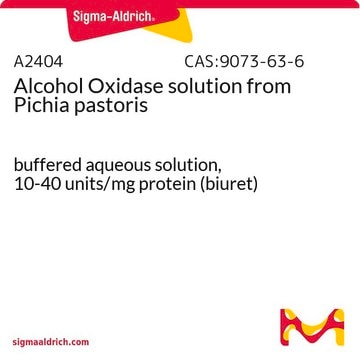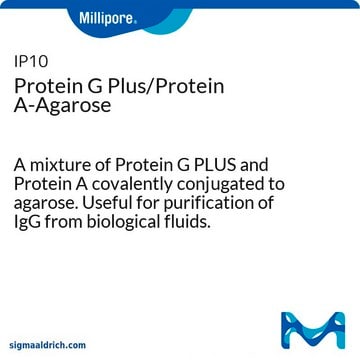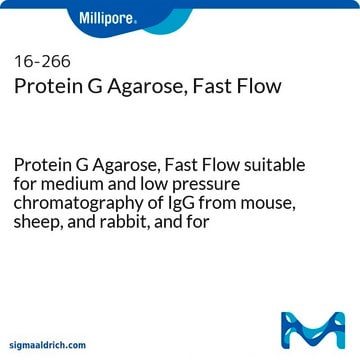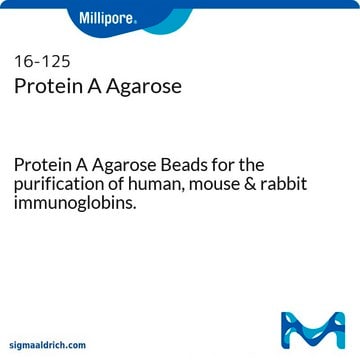A6941
Alcohol Oxidase from Candida boidinii
lyophilized powder, 5-15 units/mg protein
Sinónimos:
AOD1, AOX, Alcohol:oxygen oxidoreductase
About This Item
Productos recomendados
biological source
fungus (Candida boidinii)
Quality Level
form
lyophilized powder
specific activity
5-15 units/mg protein
mol wt
octomer 600 kDa by sedimentation equilibrium
solubility
100 mM potassium phosphate, pH 7.5: soluble 1.0 mg/mL at 25 °C (Cold)
storage temp.
−20°C
¿Está buscando productos similares? Visita Guía de comparación de productos
General description
Alcohol Oxidase (AOX) is a homo-octamer composed of eight flavin adenine dinucleotide (FAD) cofactors and belongs to the glucose-methanol-choline (GMC) family of oxidoreductases. The AOX1 and AOX2 genes are responsible for encoding AOX. Alcohol oxidase is primarily localized in the peroxisome but is also found in the cytoplasm. Alcohol oxidase is a 600 kDa homooctomeric flavoprotein with eight equal 74 kDa subunits; each containing a flavin adenine dinucleotide (FAD) molecule.
Application
- to catalyze the oxidation of short-chain, primary, aliphatic alcohols to their respective aldehydes .
- to study methanol metabolism in yeasts, such as Candida, Pichia, and Hansenula.
- to study protein translocation into peroxisomes.
- for the determination of ethanol concentration in alcoholic drinks using enzymatic assay.
- in development of enzyme electrode for the determination of alcohols.
Biochem/physiol Actions
Unit Definition
Physical form
Storage Class
11 - Combustible Solids
wgk_germany
WGK 3
flash_point_f
Not applicable
flash_point_c
Not applicable
ppe
Eyeshields, Gloves, type N95 (US)
Certificados de análisis (COA)
Busque Certificados de análisis (COA) introduciendo el número de lote del producto. Los números de lote se encuentran en la etiqueta del producto después de las palabras «Lot» o «Batch»
¿Ya tiene este producto?
Encuentre la documentación para los productos que ha comprado recientemente en la Biblioteca de documentos.
Los clientes también vieron
Protocolos
To measure alcohol oxidase activity, this assay uses 2,2′-azino-bis-(3-ethylbenzothiazoline-6-sulfonic acid) and a continuous spectrophotometric rate determination at 405 nm.
To measure alcohol oxidase activity, this assay uses 2,2′-azino-bis-(3-ethylbenzothiazoline-6-sulfonic acid) and a continuous spectrophotometric rate determination at 405 nm.
To measure alcohol oxidase activity, this assay uses 2,2′-azino-bis-(3-ethylbenzothiazoline-6-sulfonic acid) and a continuous spectrophotometric rate determination at 405 nm.
To measure alcohol oxidase activity, this assay uses 2,2′-azino-bis-(3-ethylbenzothiazoline-6-sulfonic acid) and a continuous spectrophotometric rate determination at 405 nm.
Nuestro equipo de científicos tiene experiencia en todas las áreas de investigación: Ciencias de la vida, Ciencia de los materiales, Síntesis química, Cromatografía, Analítica y muchas otras.
Póngase en contacto con el Servicio técnico









